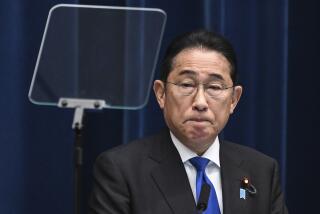Ruling Party Rebels Plan to Join Move Against Japan’s Premier
- Share via
TOKYO — A rebel faction of the ruling Liberal Democratic Party declared Wednesday that it will side with the opposition to pass a no-confidence motion against Prime Minister Kiichi Miyazawa, an act that could precipitate a general election.
Six opposition groups, led by the Socialists, submitted the motion this morning, NHK television reported. A vote could come Friday, at the earliest.
“No leadership at all has come from Miyazawa,” complained Chairman Koshiro Ishida of the Buddhist-backed Komei (Clean Government) Party.
The moves came after Miyazawa abandoned a pledge that he had repeated for weeks to work out a compromise with the opposition and enact sweeping political reforms in the current session of Parliament, which ends Sunday.
Instead, Miyazawa told his party’s General Affairs Board that he had decided to put to a vote the party’s own proposal for single-seat districts. The proposal, which would give the Liberal Democrats as many as 80% of the seats in the lower house of Parliament, faces certain defeat in the opposition-controlled upper house.
Ruling party rebels nominally led by former Finance Minister Tsutomu Hata said they would either boycott the balloting or vote with the opposition on the no-confidence motion. If Hata and his 34 followers vote with the opposition, the motion will pass.
Failure to enact reforms after repeated promises “means that the people have been deceived, that Miyazawa is a ‘liar president’ of the ruling party and that the Liberal Democratic Party becomes ‘the party of deception,’ ” said Keiwa Okuda, a Hata follower.
It was the first time since 1980 that a rebellion in the ruling party threatened to allow a no-confidence motion to pass. Thirteen years ago, the late Prime Minister Masayoshi Ohira called a general election after he lost such a motion. Miyazawa could do the same--or avert defeat by dissolving the lower house before a vote.
With Japan’s politics in disarray, prices on the Tokyo Stock Exchange fell, the value of the yen weakened in relation to the dollar, and business leaders lashed out against the ruling party.
Hiroshi Saito, president of Nippon Steel and head of the Japan Steel Federation, complained that “a dissolution of the lower house and a general election would create a vacuum in politics that would be a drag on the economy and a major setback to economic recovery.”
It also would mean that campaigning would be going on full tilt as the Group of Seven economic summit of advanced industrialized democracies is held here July 7-9.
Even if the lower house is not dissolved, a lower-house election must be held by next February, and the Liberal Democrats’ decision to drop political reform hands the opposition a powerful campaign weapon. Miyazawa has admitted that voter mistrust of politics, spurred by one scandal after another dating back to 1988, has reached an all-time high.
Ruling party strategists, however, appeared to have decided that voters are equally disgusted with the disarray of opposition parties and will again turn to the Liberal Democrats.
More to Read
Sign up for Essential California
The most important California stories and recommendations in your inbox every morning.
You may occasionally receive promotional content from the Los Angeles Times.













